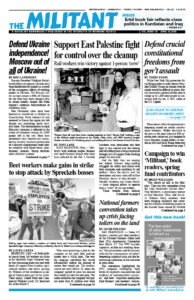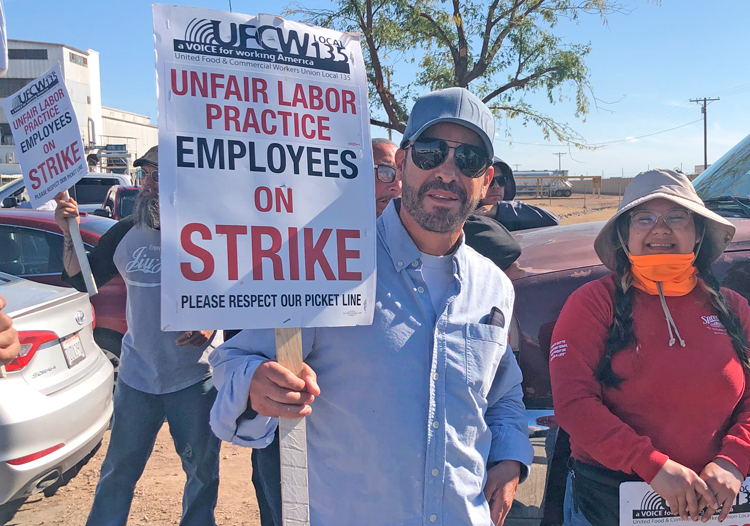BRAWLEY, Calif. —A lively picket line of some 100 workers on strike at the Spreckels Sugar Company sugar beet processing plant was met with honks of support from truckers, agricultural workers and others passing by. Workers at the warehouse in Imperial County were part of the strike. Their union, United Food and Commercial Workers Local 135, launched the strike March 9.
They were protesting a plan by the company to roll over their pension money into a 401(k) plan. The way the company calculated this would substantially reduce the amount of money they would get. The workers stayed out until March 21, when the company agreed to raise the amount they would put into the new plan. The union estimates the company will pay out more than $1 million over what they originally offered.
“The major issue in this strike is the attack on the pension. I’m 61 and was planning on retiring in a few years. But I’ll lose close to 50% of what I was promised if we don’t fight this,” said Salvador Solorzano, a mechanic and maintenance worker with 25 years seniority, when we visited the picket line the first week of the strike. While the workers’ current contract goes through 2025 and allows the company to make a 401(k) plan available, it does not say the funds accrued in their pensions would all be transferred to the 401(k).
“We went into the contract with good faith and were promised the pension funds would be frozen,” Clarissa Zavala, 31, a picket captain and shop steward said.
“This is the first time I have been on strike,” said Felipe Rodriguez, a welder with 20 years working in the plant. “It’s very sad to see this situation.” There is a $60,000 difference in what he previously would get in his pension and what the company would put into a 401(k).
“We’re striking at a good time,” Zavala said. “The sugar beets can’t stay in the ground too long or they get over-ripe and rot, or they get too hard and lose sugar content.” The season for harvesting and processing the beets is just gearing up and the plant would normally be operating 24 hours a day, seven days a week from April through July or August. When the harvest is on, they produce 9,600 tons a day.
During the harvest, seasonal workers could bring the workforce up to 300 or more. It’s the only beet processing plant in the valley. The bosses filed for an injunction to halt the strike, but the judge ruled against them.
‘Bosses must comply with contract’
“We want them to comply with the contract,” said fabricator Miguel Ramirez. His pension would have been cut by more than half. “They said it would be frozen.”
Many of the workers commute daily from Mexico, he said, which often takes three hours. During the harvest workers are on seven days, off three days, on seven, off two the next week, and off only one day the third, and they change shifts each week.
“We’ve been receiving a lot of support from the community,” said Ramirez.
I talked to two pickets who were seasonal workers. One said she worked in the fields the rest of the year. They make $17 an hour. The full-time workforce includes skilled workers who do maintenance year-round. Zavala, a boiler maker who learned her trade working in the fisheries in Alaska, makes $27.50 an hour. These are still among the higher-paying jobs in an area that has the lowest per capita income in the state, and is one of the few jobs where there is a union.
Spreckels Sugar is a subsidiary of the Southern Minnesota Beet Sugar Cooperative. Zavala said the unions are stronger in Minnesota. “There a worker doing my job makes $42 an hour.
“Two years ago, I never thought I’d be a picket captain,” she said. “But one of the other shop stewards told me that I should get active in the union because I stood up for myself against the bosses.”
The Imperial Valley, with roughly half a million acres of farmland, is where most of the winter vegetables in the U.S. are grown. In spite of all the wealth created here, the county, which is 85% Latino, is one of the poorest in the country. Unemployment rates are four times the state average.
In these conditions the fight was closely watched. While the settlement means the company had to pay thousands of dollars more to workers, some were not happy it didn’t guarantee them everything they had in their pensions.
“I feel like the victory is us showing we are united and can come together and that we will stand as one to fight for our rights,” said Zavala. “It was a hard process to put the strike together.” Some people were fearful of losing their job or facing retaliation.
“People are now thinking of what we can win in the next contract,” she said. “The only way we can get something is solidarity and we showed this time we can do that.”


